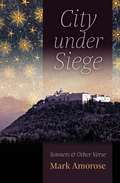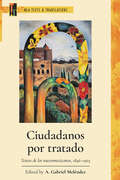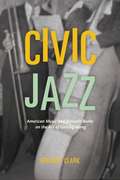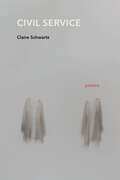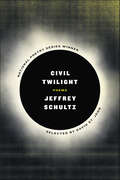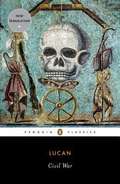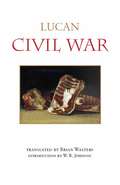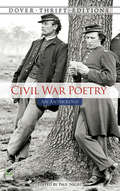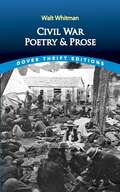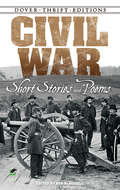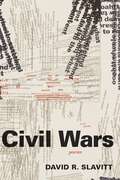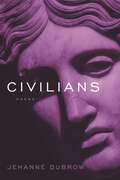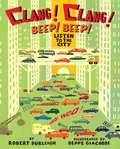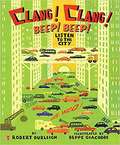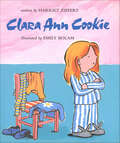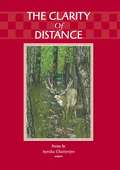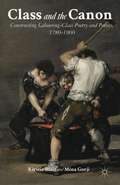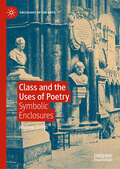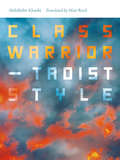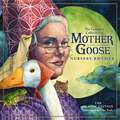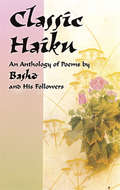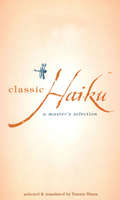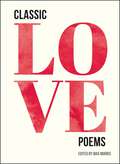- Table View
- List View
City Under Siege: Sonnets and Other Verse
by Mark AmoroseIn City under Siege, poet Mark Amorose ranges widely across Western history. In poem after poem of elegant formality, the reader is taken on a journey from the pre-Christian world through biblical times, on to the high noon of medieval Christendom, and finally, through a flawed Reformation, Enlightenment, and Romanticism, to the spiritual wastelands of modernity. Amorose praises creation, the Catholic Church, Mary, angels, saints, and martyrs; he condemns reductive scientism, soulless commercialism, and self-serving relativism. City under Siege is an heroic defense of the City of God, a city now under siege, yet against which, in the end, no force can ever prevail.
Ciudadanos por tratado: Textos de los nuevomexicanos, 1846–1925 (MLA Texts and Translations #46)
by A. Gabriel MeléndezThis volume gathers works produced by Spanish-speaking people of Mexican descent who became United States citizens by virtue of the Treaty of Guadalupe Hidalgo (1848) and whose ancestors had resided in New Mexico, Arizona, California, Texas, and Colorado for hundreds of years prior to the Mexican-American War. The writings in this collection, drawn from various genres, were composed at a time marked by the confluence of tradition and change. In addition to facing unprecedented challenges to their rights, livelihoods, language, and religion, the writers experienced the arrival of the railroad, the telegraph, film, and radio; they fought in the American Civil War, the Spanish-American War, and World War I; and they saw Arizona and New Mexico gain statehood in 1912. This anthology of songs, poems, speeches, and journalism shows the persistence of a vibrant culture in the face of upheaval and change.
Civic Jazz: American Music and Kenneth Burke on the Art of Getting Along
by Gregory ClarkJazz is born of collaboration, improvisation, and listening. In much the same way, the American democratic experience is rooted in the interaction of individuals. It is these two seemingly disparate, but ultimately thoroughly American, conceits that Gregory Clark examines in Civic Jazz. Melding Kenneth Burke’s concept of rhetorical communication and jazz music’s aesthetic encounters with a rigorous sort of democracy, this book weaves an innovative argument about how individuals can preserve and improve civic life in a democratic culture. Jazz music, Clark argues, demonstrates how this aesthetic rhetoric of identification can bind people together through their shared experience in a common project. While such shared experience does not demand agreement—indeed, it often has an air of competition—it does align people in practical effort and purpose. Similarly, Clark shows, Burke considered Americans inhabitants of a persistently rhetorical situation, in which each must choose constantly to identify with some and separate from others. Thought-provoking and path-breaking, Clark’s harmonic mashup of music and rhetoric will appeal to scholars across disciplines as diverse as political science, performance studies, musicology, and literary criticism.
Civil Service: Poems
by Claire SchwartzA study in complicity with crushing state violence and an invitation to a chilling, remarkable debut.While the spectacle of state violence fleetingly commands a collective gaze, Civil Service turns to the quotidian where political regimes are diffusely maintained—where empire is the province of not a few bad actors, but of all who occupy and operate the state. In these poems populated by characters named for their occupations and mutable positions of power—the Accountant, the Intern, the Board Chair—catastrophic events recede as the demands and rewards of daily life take precedence. As a result, banal authorizations and personal compromises are exposed as the ordinary mechanisms inherent to extraordinary atrocity. Interwoven with bureaucratic encounters are rigorous studies of how knowledge is produced and contested. One sequence imagines an interrogation room in which a captive, Amira, refuses the terms of the state’s questioning. The dominant meanings of that space preclude Amira’s full presence, but those conditions are not fixed. In a series of lectures, traces of that fugitive voice emerge as fragmentary declarations, charging the reader to dwell beside it and transform meaning such that Amira might be addressed.In this astonishing debut, Claire Schwartz stages the impossibility of articulating freedom in a nation of prisons. Civil Service probes the razor-thin borders between ally and accomplice, surveillance and witness, carcerality and care—the lines we draw to believe ourselves good.
Civil Twilight: Poems
by Jeffrey SchultzFrom a two-time winner of the National Poetry Series competition, a bold new collection of poems lamenting the state of the world—and offering poetry that might save it“Civil twilight” occurs just before dawn and just after dusk, when there is still light enough to distinguish the shapes and contours of objects but not the richness of their detail.Beginning with the idea that nothing can be seen clearly in the light of the present, the poems in Civil Twilight attempt to resuscitate lyric’s revelatory impulse by taking nothing for granted, forming their materials under the light of a critical gaze. If there is any chance left for a humane world, a world in which poetry might become as transparent and evocative as it has always longed to be, these poems desire nothing but to find hints of that chance, and to follow them as far as they might lead.Jeffrey Schultz brings his distinct voice to bear on the stuff of twenty-first-century America—languishing FOIA requests, graffiti-covered city walls, the violent machinery of the state—without abandoning hope that the language of poetry might transport us to some better and as-yet-unimaginable world. Turning a call to be “civil” on its head, this collection nudges the reader toward revolution.
Civil War
by LucanA magnificent new translation of the enduring epic about the sundering of the Roman Republic. Lucan lived from 39-65 AD at a time of great turbulence in Rome. His Civil War portrays two of the most colorful and powerful figures of the age-Julius Caesar and Pompey the Great, enemies in a vicious struggle for power that severed bloodlines and began the transformation of Roman civilization. With Right locked in combat with Might, law and order broke down and the anarchic violence that resulted left its mark on the Roman people forever, paving the way for the imperial monarchy. Accessible and modern yet loyal to the rhetorical brilliance of the original, this will be the definitive Civil War of our times. .
Civil War
by Lucan Brian Walters W. R. JohnsonWritten in the reign of Nero—the emperor against whom Lucan was implicated in a conspiracy and by whom he was compelled to commit suicide at the age of 25—the poet's dark, ambiguous, unfinished masterpiece focuses on the disintegration of the Roman body politic and the war between Julius Caesar and Pompey that ultimately lead to the end of the Roman republic. While aiming for a poem both as rugged as Lucan's—with its mix of history and fantasy, of high and low registers, of common and uncommon turns of phrase, of narrative and declamation—and as reader-friendly as possible, Brian Walters owns that he has "nowhere tried to simplify the rhetorical excesses that are the essence of Lucan's poem, the real meat and bone of the Civil War." A brilliant Introduction by W. R. Johnson discusses the poem's relationship to Nero and monarchy; its invocations of both the gods and chaos; the real hero of the Civil War; and the poem's end and narrative styles. Synopses of individual books; suggestions for further reading; a glossary of names, places, and Roman institutions; and a map are also included.
Civil War Poetry (Dover Thrift Editions: Poetry)
by Paul NegriThe long agony of the American Civil War inspired a wealth of contemporary verse — from sentimental doggerel to sublime lyrics that rank among the finest American poetry. This inexpensive anthology brings together a superb selection of poems from both North and South, comprising the best and most representative poetry of those turbulent times.Over 75 poems include works by many of America's greatest 19th century writers: Walt Whitman, Herman Melville, Ralph Waldo Emerson, Henry Wadsworth Longfellow, John Greenleaf Whittier, William Cullen Bryant, and many more. Also included are many fine poems by lesser-known poets of the period: Julia Ward Howe, Henry Timrod, Edwin Markham, Edmund Clarence Stedman, Francis Miles Finch, George Henry Boker, and more.Among the selections in this volume: Julia Ward Howe's "Battle Hymn of the Republic," Ralph Waldo Emerson's "Boston Hymn," John Greenleaf Whittier's "Barbara Frietchie," "The Death of Slavery," by William Cullen Bryant, Henry Wadsworth Longfellow's "Killed at the Ford," Henry Howard Brownell's "The Bay Flight," "All Quiet Along the Potomac Tonight" by Ethel Lynn Beers, "O Captain! My Captain!" and "When Lilacs Last in the Dooryard Bloom'd" by Walt Whitman, and many more.Ranging from boisterous calls to arms to poignant memorials for the slain, these poems reflect the heroism, horror, exaltation, and anguish of the bloodiest and most crucial conflict in the nation's history. Anyone interested in the Civil War or American literature of the period will want this collection on their bookshelves.
Civil War Poetry and Prose (Dover Thrift Editions: Poetry)
by Walt WhitmanWalt Whitman experienced the agonies of the Civil War firsthand, working, in his forties, as a dedicated volunteer throughout the conflict in Washington's overcrowded, understaffed military hospitals. This superb selection of his poems, letters, and prose from the war years, filled with the sights and sounds of war and its ugly aftermath, express a vast and powerful range of emotions.Among the poems include here, first published in Drum-Taps (1865) and Sequel to Drum-Taps (1866), are a number of Whitman's most famous works: "O Captain! My Captain!" "The Wound-Dresser," "When Lilacs Last in the Dooryard Bloom'd," and "Come Up from the Fields, Father." The letters and prose selections, including Whitman's musings on the publication of his works, on the wounded men he tended, and his impressions of Lincoln traveling about the city of Washington, offer keen insights into an extraordinary era in American history.
Civil War Short Stories and Poems (Dover Thrift Editions)
by Bob BlaisdellThis anthology commemorates the 150th anniversary of the American Civil War with reflections from both sides of the conflict. Compiled by an expert in the literature of the era, the poems and short stories appear in chronological order. They trace the war's progress and portray a gamut of moods, from the early days of eagerness to confront the foe to long years of horror at the ongoing carnage and sad relief at the struggle's end.Selections include the poetry of Walt Whitman, John Greenleaf Whittier, and Henry Wadsworth Longfellow; observations by Herman Melville and Louisa May Alcott; and noteworthy fiction by Ambrose Bierce ("An Occurrence at Owl Creek Bridge") and Mark Twain ("A True Story, Repeated Word for Word, As I Heard It"). Lesser-known writers, many of them anonymous, offer heartfelt testimonials and eyewitness accounts from battlefields and the homefront.
Civil Wars: Poems
by David R. SlavittPraise for David R. Slavitt"Slavitt's touch is light, and he writes beautifully.... His satire is sharp, and he can be wildly funny." -- New York Times Book Review"One of America's most lucid and classical poets.... Slavitt's attitude is, as one would expect of a Hebrew as well as Greco-Latin classicist, sharply questioning as well as tragic. He is a poet one reads to know more." -- Booklist "Slavitt is both smart and wise; he's as well known for his translations of the writers of antiquity as he is for his original work, both poetry and prose.... With a rich sense of humor, a bit of attitude, and a fascination with details, even minutiae, Slavitt tries his hand at new and curious measures and forms as well as seemingly free-range meditations -- or, one might say, meanderings." -- Library Journal The bravura of David R. Slavitt's first book of poems, published more than fifty years ago, continues to reverberate through his newest collection in a voice matured and roughened by age.Civil Wars conjures the mutterings of old men: meditations -- despondent yet playfully witty and bold -- on the meaning of life and death, the reasoning for human action or inaction, and misremembered memories. Nothing proves too lofty or too trifling for the poet's scrutiny. Slavitt's attention roves from the carnage inflicted by the Achaeans at Troy, to the performances of Borrah Minevich and the Harmonica Rascals, from meditations on Spinoza to the baseball of the New York Yankees. He considers with deliberation all of these subjects and deems them necessary to help create a spiritual connection in our lives. Slavitt encourages contemplation of the world and writing rather than acceptance of the thoughts of the critic, who "comes, austere, a man of authority, / and offers to help" but only dilutes the power of a poem. In this collection, Slavitt also includes translations of Greek, Hebrew, Provençal, French, and Old English poems, including a little-known piece by the mathematician Pierre de Fermat and the Old English epic poem "The Battle of Maldon."
Civilians: Poems
by Jehanne DubrowThe final volume in Jehanne Dubrow’s groundbreaking trilogy about the experience of being a modern military spouse, Civilians examines a significant moment of transformation in a military marriage: the shift from active-duty service to civilian life. After twenty years in the U.S. Navy, Dubrow’s husband came to the end of his tenure as an officer. Civilians addresses what it means when someone who has been trained for war returns from the confining, restrictive space of a naval vessel. Set amid America’s seemingly endless conflicts, Dubrow’s poems confront pressing questions about the process of transitioning to a new reality as a noncombatant: What happens to the sailor removed from a world of uniforms and uniformity? How is his language changed? His geography? And what happens to a wife once physical and emotional distances are erased and she is reunited with her husband, a man made strange and foreign by his contact with war? Civilians is a book both shadowed by and in conversation with the classics, including Ovid’s Metamorphoses, Homer’s Odyssey, Euripides’s The Trojan Women, and Sophocles’s Philoctetes. Blending formal and free verse, with materials ranging from the historical to the personal, Dubrow offers readers a candid look at the experience of watching a loved one adjust to homelife after a career of military service.
Clang! Clang! Beep! Beep!: Listen to the City
by Robert BurleighFrom morning until night, a city is filled with such sounds as the roars and snores of a subway ride, the flutters and coos of pigeons, and the shouts and beeps of drivers in traffic
Clang! Clang! Beep! Beep! Listen to the City: Listen To The City (Elementary Core Reading Ser.)
by Robert Burleigh Beppe GiacobbeNIMAC-sourced textbook <P><P>From morning until night, a city is filled with such sounds as the roars and snores of a subway ride, the flutters and coos of pigeons, and the shouts and beeps of drivers in traffic.
Clap Your Hands: A Celebration of Gospel
by Toyomi IgusClap Your Hands is an inspirational, joyous celebration of poetry, art, and rhythm, tracing the history of African American gospel music and the poets, singers, and thought leaders who have fearlessly and soulfully contributed to the spiritual and social evolution of America. This powerful and poetic read bursts with vibrant artwork and is rich in personal notes and information that will interest any history buff or music enthusiast.Created by the dynamic author and illustrator team of Toyomi Igus and Michele Wood, winners of the Coretta Scott King Award for I See the Rhythm, Clap Your Hands shares the Black history behind gospel music that has courageously broken all color barriers, influencing both worship and popular culture in America for hundreds of years. Clap Your Hands is great for children ages 4 to 8. Inside, you&’ll find:Notes from the author and the illustrator sharing their personal inspirations and influences, as well as their research on the roots and evolution of gospel musicHistorical notes about the events covered in the book, exploring the cultural importance of gospel music throughout historyFurther reading section, discography, and discussion questions to encourage learning and engagementA running timeline of all historical milestones—from the first slaves to President Obama&’s inaugurationReaders of all ages will be captivated by this informative and inspirational blend of poetry, art, and music that honors gospel music and reflects its journey.
Clara Ann Cookie
by Harriet Ziefert"When Clara Ann Cookie had to get dressed, she got grumpy and grouchy and very distressed." Getting dressed in the morning is simply too much for Clara Ann to face. Lucky for her she has a resourceful mother who comes up with a clever face-making game to help make the morning routine a lot less monotonous and considerably more fun. Harriet Ziefert portrays this all too common struggle between parent and child with wit and humor, while Emily Bolam's artwork captures Clara Ann's emotions perfectly. Children will delight in making faces along with Clara Ann as she gets dressed.
The Clarity Of Distance
by Ayesha ChatterjeeSomeone once asked Ayesha Chatterjee what idiom she wrote in. She still doesn't know what the answer to that is, but the poems in this collection attempt to address the issue behind that question: that of belonging versus the universality of experience. Written in spare language and often using metaphors drawn from both Eastern and Western sources, these poems pare down the complexity of existence in today's global world into simple moments of truth. Much of her poetry is very short, ten lines or less, some of it is photographic and all of it is approachable. Chatterjee believes that the power of poetry is in its accessibility and this is reflected in the simplicity of her writing. Her poetry is intended to pry her readers out of complacency into looking at the world differently, perhaps even into thinking of their place in it. There is a soft thread of violence running thinly through this collection juxtaposed against the imagery in much the same way as the intention of her approach.
Class and the Canon
by Kirstie Blair Mina GorjiExamining how labouring-class poets constructed themselves and were constructed by critics as part of a canon, and how they situated their work in relation to contemporaries and poets from earlier periods, this book highlights the complexities of labouring-class poetic identities in the period from Burns to mid-late century Victorian dialect poets.
Class and the Uses of Poetry: Symbolic Enclosures (Sociology of the Arts)
by Andrew SmithThis book provides new empirical evidence about the ways in which social inequalities, especially those of class, shape and delimit forms of cultural reception and creative opportunity. How does it come about that, in George Orwell’s words, ‘the divorce between poetry and popular culture is accepted as a sort of law of nature’? Drawing on qualitative research conducted in and around Glasgow, Poetry, Class and Symbolic Violence explores how working-class readers engaged with, made sense of, and contested a sense of exclusion from, contemporary poetry. In doing so it sheds light on the symbolic enclosure of poetry, on how that enclosure takes shape in the encounter between readers and poems, but also on why poetry continues to matter. Through these conversations, and in further interviews with unpublished poets, it reflects on the creative and expressive affordances of poetry, on what can be done with poetry and what it can make possible. Sociologists have had little to say about poetry as a distinctive esthetic practice. Poetry, Class and Symbolic Violence tries to break that silence and to make a start on constructing a critical sociology of poetry for today.
Class Warrior—Taoist Style
by Matt Reeck Abdelkéir KhatibiAbdelkébir Khatibi (1938–2009) is one of the most important writers and thinkers to emerge from North Africa in the second half of the twentieth century. Though not widely known beyond the Francophone world, Khatibi’s critical and creative works speak to the central concerns of postcolonial and postmodern life. Offered here in English for the first time, his long poem from 1976, Le lutteur de classe à la manière taoïste is a wildly inventive, transgressive, and important text. Class Warrior delivers a kind of free-verse Marxist handbook, written with the energy, movement, and style of a highly idiosyncratic Taoism. Matt Reeck’s compelling translation captures the stylistic and thematic beats of Khatibi’s verse, rendering the deceptively simple language of the original without losing its extraordinary layers and complexities. The introduction provides biographical context and an overview of Khatibi’s poetics of the orphan, a subject position that seeks to avoid authenticating notions of origins and that is also constantly restless and forever questing. This is a rich text for contemporary readers of poetry, as well as scholars of postcolonial theory.
The Classic Collection of Mother Goose Nursery Rhymes: Over 100 Cherished Poems and Rhymes for Kids and Families (The Classic Edition)
by Mother GooseRediscover the timeless nursery rhymes of Mother Goose in this gorgeous picture book, packed with beautiful, full-color illustrations and a stunning four-panel gatefold! These charming bedtime stories and fairy tales will delight and enchant children of all ages.Children and adults alike will be charmed by this freshly presented collection of classic nursery rhymes, featuring more than 100 enchanting and colorful illustrations by Rhode Island School of Design illustrator, Gina Baek.This Classic edition of The Classic Collection of Mother Goose Nursery Rhymes:Features a beautiful dust jacket and four-page fold out illustrationIs great for children ages 5+Perfect for family read alouds or as bedtime storiesMakes a great gift for young families, new parents, baby showers, or holiday&’sRediscover favorite tales, rhymes, and stories such as:Twinkle, Twinkle Little StarHumpty DumptyJack and JillThe Cat and the FiddleBaa, Baa, Black Sheepand more!
Classic Haiku: An Anthology of Poems by Basho and His Followers
by Basho Asataro MiyamoriWith the utmost economy and skill, the haiku poet paints a vast mural on a narrow canvas. Working within the strict 17-syllable limits of the traditional Japanese form, Matsuo Basho (1644-1694) and other masters evoke elements of the natural world to conjure up timeless moods and emotions. This volume features dozens of Basho's poems as well as works by his predecessors and ten of his disciples -- Kikaku, Ransetsu, Joso, and Kyoroku among them. Intended principally for readers with no knowledge of Japanese literature, this treasury includes the original Japanese text, a transliteration, and English translations for each verse; most poems also include a brief explication.
Classic Haiku
by Yuzuru MiuraSparrowsPlaying hide-and-seekAmong the tea blossoms.--Kobayashi IssaHaiku, the traditional Japanese verse form composed of seventeen syllables, can express a dramatic scene or philosophical idea in a single line of verse. In this collection, haiku poet Yuzuru Miura has selected and translated poems by past masters such as Basho and Buson, as well as haiku by contemporary poets. Fireflies, pheasants, a summer shower, winter snow, camellias--all the favorite haiku subjects are included among the one hundred poems of this impressive anthology. Classic Haiku evokes the peace and serenity of the Japanese way of life.
Classic Love Poems (Love Ser.)
by Max MorrisThe best love poetry is passionate and timeless, expressing our deepest feelings and strongest desires with grace and emotion. Ranging from Sappho, Chaucer and Shakespeare through to Emily Dickinson and Christina Rossetti, this elegantly illustrated anthology presents a selection of moving and enduring poems that speak straight to the heart.
Classic Love Poems (Love Ser.)
by Max MorrisThe best love poetry is passionate and timeless, expressing our deepest feelings and strongest desires with grace and emotion. Ranging from Sappho, Chaucer and Shakespeare through to Emily Dickinson and Christina Rossetti, this elegantly illustrated anthology presents a selection of moving and enduring poems that speak straight to the heart.
